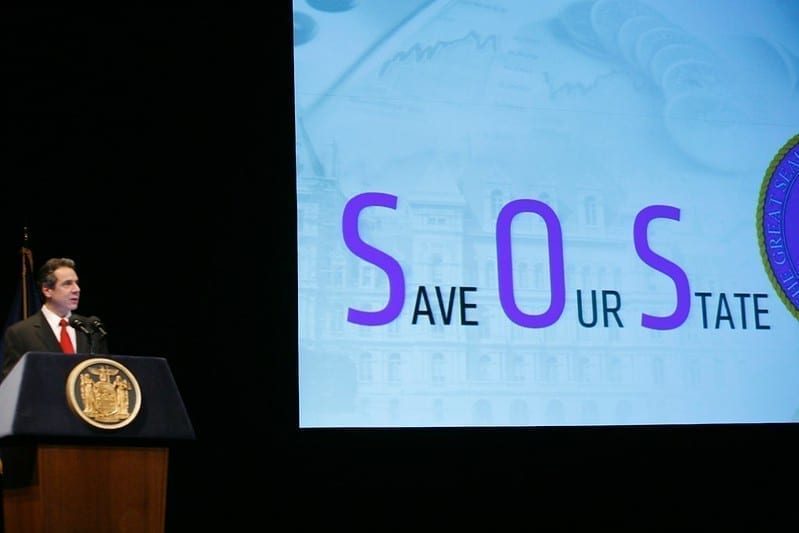Search Posts
Recent Posts
- To Boost the City’s Recovery, Get ‘Learning Leaders’ Back in School March 29, 2022
- For State’s Future, The Governor Must Say No Sometimes January 26, 2022
- A better deal for retirees and NYC: But the city made two mistakes with its Medicare Advantage Plus plan October 25, 2021
- Who Decides How Public Money Is Spent? October 15, 2021
- The lame duck and the hatchling: How to run the transition between Bill de Blasio and his successor July 5, 2021
Categories
Subscribe!
How to Craft the Bare Bones State Budget New York Needs

This week the New York State Legislature is supposed to adopt a budget for the 2020-21 fiscal year that begins Wednesday, April 1. Legislators are facing an unparalleled challenge: the coronavirus has caused the bottom to very suddenly fall out of the state’s economy and therefore, its revenue. Without restaurants and stores open, there can be very little sales tax collected; hundreds of thousands of employees laid off means no personal income tax withheld from paychecks; slowed real estate sales means reduced transfer and other transaction-related taxes; and so on and so on.
Estimates on the loss of state revenue for the coming year range from Comptroller Tom DiNapoli’s $7 billion to State Budget Director Robert Mujica’s $15 billion. No one really knows and it depends on how quickly things can start getting back to normal, but there is no question the revenue fall off is going to be dramatic.
Governor Andrew Cuomo, understandably desperate about how to deal with the fiscal crisis while fighting the virus, has expressed frustration and disappointment that the U.S. Congress is not filling this huge budget hole. Congress has come through with aid that will help offset some of the costs of Medicaid, help with other virus-related medical costs, provide some support to state and local governments, and most importantly, give direct assistance to families and businesses. It may well be that there will be additional congressional action to stimulate the economy and, possibly, provide more state and local budget assistance.
But New York cannot and should not wait. Our budget problems are structural, and they have been brewing since long before the virus hit the U.S.
Now is the time for the governor and legislative leaders to show the moral courage and fortitude to do what they know is needed, even if it is not what the interest groups that usually prevail in Albany want:
Stop adding billions in school aid, especially for wealthy districts that already spend more than $30,000 a year per student. There is absolutely no justification for increasing school aid; instead it should be reallocated to those districts that need it. If we don’t exercise control now, we will soon be faced with having to cut aid as Governor Patterson had to do in the Great Recession of 2008.
Adopt the reforms recommended by the Medicaid Redesign Task Force. Yes, some of the reforms, such as imposing controls on fiscal gimmicks used by some families to avoid responsibility for the long-term care of their loved ones, may not go into effect until after the national state of emergency is lifted. But others can be implemented right away and far more is needed to cut the growth in long-term and personal care, which have been growing exponentially. All the reforms should be adopted now so they can go into effect when possible and far more Medicaid savings needs to be found ASAP.
Cut back on economic development programs that are not generating a return on investment and/or are not essential. For example, we just cannot afford to give $400+ million a year in tax credits to the TV and film industry.
Freeze public employee salaries, including not just the planned imminent across the board 2% increase but also automatic step increases. Yes, we value our hard-working and dedicated public-sector workers but now is not the time to give raises to already reasonably compensated people while so many New Yorkers are struggling to pay their rent and put food on the table. Public employee unions should support this policy until economic conditions improve.
While many state agencies are already operating at a bare bones level, it is time to impose an across the board percentage cut in spending except for those activities that are directly related to fighting the coronavirus pandemic. Yes, this will be characterized as ‘draconian’ but there is no choice if the state is to husband its scarce resources to provide essential services.
Resist calls to increase taxes on anyone. Now is surely not the time to raise taxes, even on wealthy people. We are already the highest taxed state, federal deductibility is severely limited, Wall Street earnings are plummeting, and more than ever, we need that small group of people who pay 40% of our income taxes to stay here and not move to less tax- (and coronavirus-) burdened states.
I watched Governor Cuomo’s daily press briefing on Sunday, in which he said he doesn’t want to wait for a federal bailout; he intends to move forward with a state budget on schedule. He is right. But it is also important to acknowledge that it is not the federal government’s fault the state is facing a major budget shortfall, and that much of our problem is that we have avoided dealing with rising costs (and low reserves) because no one wants to take the political heat. We need our representatives to step up and adopt an austerity budget on April 1. If circumstances change, it can be modified during the year and, we must all hope, pray, and do all we can to get out of this crisis so that the 2021-22 budget process is less fraught.
This post was originally published on March 30 by Gotham Gazette.